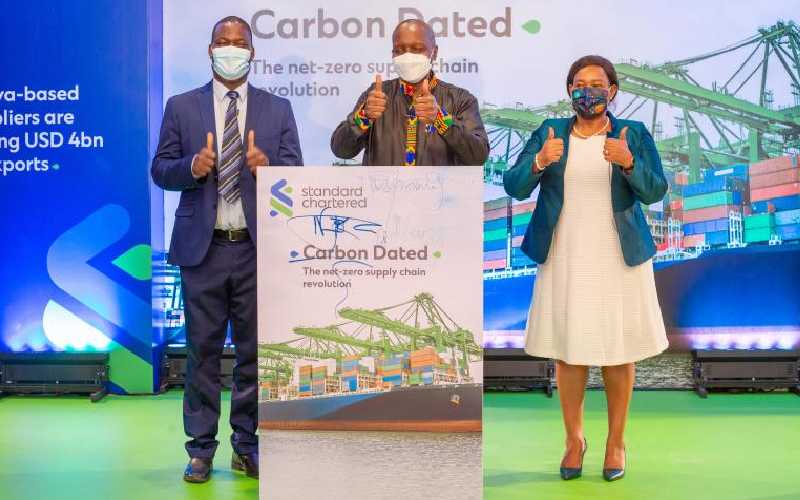Director Climate Finance Unit at the National Treasury Peter Odhengo, Standard Chartered Bank Kenya Chief Executive Kariuki Ngari and his KenGen counterpart Rebecca Miano at the launch of the Carbon dated Report in Nairobi yesterday. [Edward Kiplimo,Standard] Kenya is among nations that risk being struck off from the list of suppliers of multinational corporations as part of their decarbonisation agenda.
According to Carbon Dated, a progress report towards zero carbon emissions by 2050 prepared by Standard Chartered, six out of 10 multinational companies plan to remove suppliers who do not fit into their agenda of reducing carbon emissions in three years’ time.
By 2025, the report documents that the number of companies with this policy will rise to four out five or almost eight out of 10 (78 per cent).
This would see Kenyan suppliers lose up to $3.9 billion (Sh421.94 billion). “The majority (62 per cent) of multinational companies say they will remove some suppliers that endanger their carbon transition plan in just three years’ time,” reads part of the report. READ MORE
Standard Chartered Bank Kenya and East Africa chief executive Kariuki Ngari speaking during the launch of the report in Nairobi yesterday said decarbonisation is vital for the survival of the planet.
“Emerging markets are most at risk from climate change and are among the least prepared and represent the fastest growing sources of new carbon emissions. Kenya for example aims to achieve a net-zero carbon neutral economy by 2050,” he said.
The report notes the companies expect to exclude around a third of their current suppliers as they transition away from carbon.
The report lists Kenya as one of the leading suppliers to these companies.
Other countries that risk losing revenue include China ($512.3 billion), South Korea ($142.5 billion), UAE ($119.6 billion) and Nigeria ($34.3 billion).
The data was collected from opinion research conducted between March and April this year, with 400 leaders responsible for the sustainability for supply chains across 400 of the world’s largest multinational corporations taking part.
Out of the 12 countries mentioned in the report, only five have a timeline on net-zero commitment for carbon emissions.
